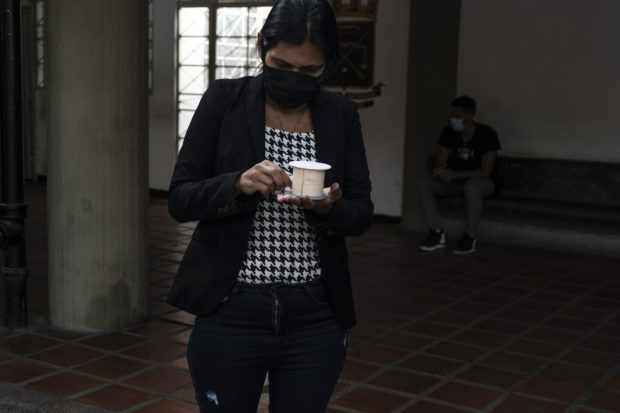In crisis-hit Venezuela, maternity wards have become death traps

Wendy Dulcey (39) leaves the crematorium of the General Cemetery of the South carrying a small urn with the ashes of the body of her son who died a month after being born in the intensive care unit of the University Hospital in Caracas on January 12, 2021. – Infant mortality in Venezuela increased 30.12% in 2016, with 11,466 deaths of children aged 0 to 1 year, and maternal mortality soared 65%, according to the latest figures published by the Ministry of Health. (Photo by Yadira PEREZ / AFP)
CARACAS — Red roses and a burning candle frame the small white casket Wendy Dulcey is caressing at a hospital morgue in Caracas.
It contains the remains of her baby son who died on December 1, 39 days after he was born — a cruel fate befalling far too many in the crisis-hit South American country.
With seven years of back-to-back recession and the highest inflation in the world, Venezuela’s hospitals are creaking skeletons of their former selves, with a critical shortage of doctors and nursing personnel, surgical equipment and medicine.
According to the latest official figures available, infant mortality in Venezuela increased almost a third in 2016 from the previous year, to 11,466 deaths among children aged zero to one.
Maternal mortality in the country of some 30 million people soared by 65 percent in the same period — a tragedy that began building long before the coronavirus pandemic.
Article continues after this advertisementDulcey nurses her still-prominent baby bump and says she has no more tears to cry.
Article continues after this advertisementShe recounts in horrifying detail the days leading up to the death of her son, Thiago, whose body she later spotted in a partly-open fridge among the corpses of other dead children.
The 39-year-old fell ill and was admitted to a hospital in the Venezuelan capital for an emergency C-section at only seven months.
She was shown away by two other maternity hospitals before she was admitted to a clinic she described as having dirty, poorly-lit corridors “full of excrement, blood, garbage.”
The lifts did not work, and there were no wheelchairs.
From the moment she arrived, “the only thing I could think about was that we weren’t going to make it out of there,” she told AFP.
Things soon went from bad to worse.
After little Thiago was born prematurely, Dulcey said staff took a used syringe to insert a feeding tube, which she claimed was never replaced.
Too small to fight
Thiago died just weeks later of a bacterial infection, and his distraught mother claims criminal negligence.
“He could not fight on his own,” she said.
Dulcey said she almost didn’t make it either, having developed uterine bleeding after the birth.
Doctor Jaime Lorenzo of the NGO Doctors United said such experiences were common.
With hospitals short on supplies, patients are often asked to bring their own bedding, gowns, food, basic items such as gauze and bandages, even drugs.
A 2019 survey by HumVenezuela, an NGO documenting the country’s humanitarian crisis, found four in ten hospitals had a shortage of basic supplies, and eight out of 10 did not have enough surgical tools or medicine.
The obstetrics wards of half the country’s maternity hospitals were partially or fully out of service in 2019, it said.
Thousands of trained doctors and nurses are among the five million Venezuelans estimated to have left the country in recent years in search of a better life elsewhere.
Someone like Dulcey, a public official with an inflation-battered income of less than $1 a month could never even think of giving birth in a private clinic, where better conditions come with a hefty price tag of about $6,000 per delivery.
‘A matter of luck’
Nineteen-year-old Briggite Perez said she went through a similar ordeal, having been shown away from five hospitals before being admitted to the one where she finally gave birth on December 26.
After trying to deliver naturally on a rusty bed with no footrest, she was wheeled into the operating room for a cesarian.
Four days after she was discharged — with her baby — an infection required Perez to be hospitalized again.
HumVenezuela’s 2019 survey found that more than half of women received inadequate obstetric care at Venezuelan public maternity centers.
Vanessa Martinez, 28, had an emergency C-section in her seventh month of pregnancy after an iron supplement prescribed to her caused a surge in blood pressure.
For her, giving birth safely in Venezuela “is a matter of luck”.
And considering herself one of the lucky ones, she dreams of nothing more than a “quiet life” with her newborn daughter Samantha, she told AFP at her home in a slum west of Caracas.
According to the World Health Organization, globally about 7,000 newborns die every day, mainly in poor countries, as well as 830 women from “preventable causes due to pregnancy and childbirth”.